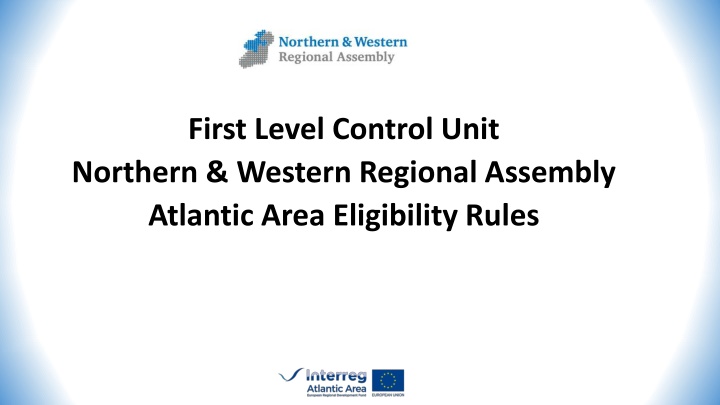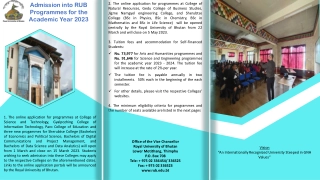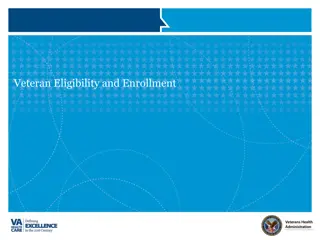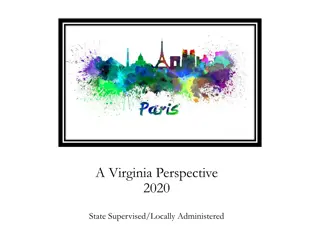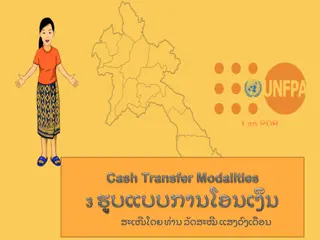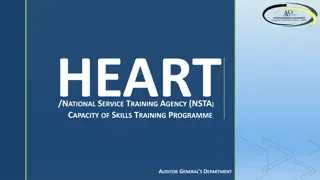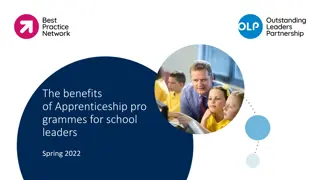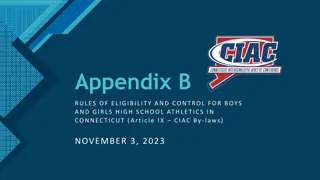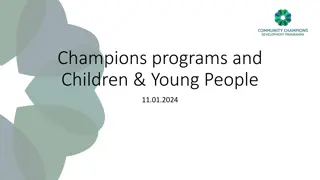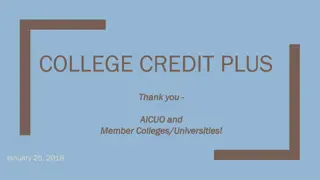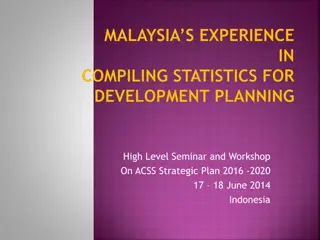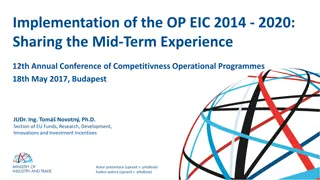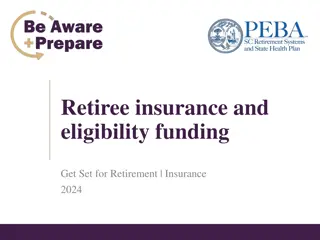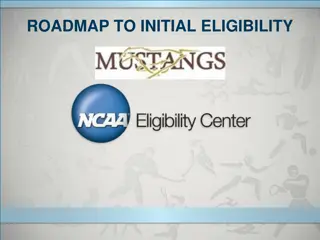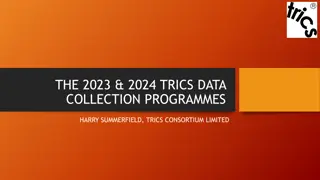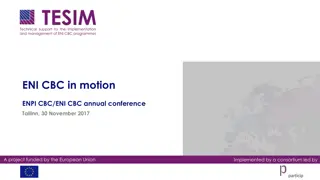Financial and Eligibility Rules for EU Cooperation Programmes
Financial and eligibility rules for EU cooperation programmes include details on the first-level control unit, sources of information, hierarchy of rules, overarching eligibility rules, and reporting overview. These rules cover areas such as project activities, expenditure eligibility, procurement rules, reporting procedures, and documentation retention. Adherence to these rules is essential for successful implementation of projects within the EU framework.
Download Presentation

Please find below an Image/Link to download the presentation.
The content on the website is provided AS IS for your information and personal use only. It may not be sold, licensed, or shared on other websites without obtaining consent from the author.If you encounter any issues during the download, it is possible that the publisher has removed the file from their server.
You are allowed to download the files provided on this website for personal or commercial use, subject to the condition that they are used lawfully. All files are the property of their respective owners.
The content on the website is provided AS IS for your information and personal use only. It may not be sold, licensed, or shared on other websites without obtaining consent from the author.
E N D
Presentation Transcript
First Level Control Unit Northern & Western Regional Assembly Atlantic Area Eligibility Rules
Sources of Information Sources of Information Programme Manual is available on https://light.ccdr- n.pt/index.php?data=8b04fd80216720f3335a4d80da05c71fb2a31f98 81e366ad4cef333fdcdde6193d0e186148338ca8e9e4c202305ef6cf This manual contains all the eligibility rules Contact FLC with day to day queries Queries regarding budget or changes to your application should be reverted back through your lead partner, who will in turn contact JS.
Hierarchy of Rules Hierarchy of Rules 1. Rules defined in EU legal framework Common Provisions Regulation (EU) 1303/2013 ERDF Regulation (EU) 1301/2013 ETC Regulation (EU) 1299/2013 Commission Delegated Regulation (EC) 481/2014 on eligibility of expenditure specific rules for cooperation programmes 2. Programme rules 3. National rules The Strictest Rule Always Applies
Overarching Eligibility Rules Overarching Eligibility Rules Related to the project activity and included in project application Necessary to achieve project objective Not supported from other EU Funds Reasonable, justified, consistent with Interreg Rules In line with the relevant public procurement rules Incurred and paid within eligible period Identifiable, verifiable, plausible and determined in accordance with relevant accounting principles Substantiated by proper evidence Registered in the beneficiaries accounts through a separate accounting system code set in place specifically for the project
Reporting Overview Reporting Overview Claims are uploaded through the online system - SIGI 6 Monthly reporting set dates. Currently not subscribed due to system issues. It is possible to put in a zero claim and include unreported expenditure in the next claim. One financial claim required per year. One onsite visit per project usually towards the end of the project Costs incurred in currency other than Euro converted at the rate applicable in month of report submission referenced to: http://ec.europa.eu/budget/contracts_grants/info_contracts/inforeuro/index_en.cf m Retention of documents clarification required.
ERDF / Matched Contribution ERDF / Matched Contribution 25 % Partner Contribution /Match Contribution 15 % Partner Contribution All Costs Partner 100 % (Full costs to be reported and checked by FLC) 10 % External Contributon 75 % AA Contribution (ERDF Funding)
Definitions Definitions Match Contribution funding from own sources / external cash contribution / in-kind contribution In-Kind Contribution contribution from outside the partner organisation i.e. services/time/equipment. Can have a different meaning for other funders. Demonstrating an in-kind contribution as a certified cost will not generate ERDF or ERDF equivalent funding; unless actual costs have been incurred.
Staff Costs Staff Costs Only staff who are employees of the partner organisation can be included under staff costs. Seconded staff and their related travel must be reported under External Expertise. Should only include staff working directly on the project. Support functions within organisation should generally be covered via overhead. Different methods to claim staff time timesheet/fixed % What can be claimed Gross pay, ER PRSI and Pension only to the extent that paid out through bank. Real cost to organisation.
Staff Costs Staff Costs GDPR ensure staff are aware of use of payslips, redact deductions. Noted that the programme manual staff cost rules have led to some confusion and this was brought to the attention of JS. Proposed amendments should be included in the next version of the manual
Office & Administration Office & Administration Partners may declare a flat rate of 15% of staff costs, what support is required? It is not necessary to provide any supporting documentation for 15% flat rate. Expenditures covered by Office & Admin include office rent, utilities, office supplies, stationary, IT support, phone, maintenance & bank charges.
Travel & Accommodation Travel & Accommodation Travel costs of staff employed by the organisation. Travel directly related to the project Costs must be paid within the reporting period. Receipts required for vouched costs. Public Sector travel and subs rates and procedures apply including deductions for meals provided. Proof of attendance required Travel outside the union part of the programme area need to be approved and tracked.
External Expertise External Expertise External expertise and services provided by a public or private body or a natural person other than the beneficiary Must be outlined in the project application form. Procurement required in line with National and EU Procurement rules. Strictest rule applies. Where possible project and EU logos must be included on tender documents.
Examples of External Expertise Examples of External Expertise First Level Control fees SME / Guest attendances at Partner meetings Travel for persons not directly employed by partner organisation Conference / registration fees (even where paid for staff). Partner meals / Transport costs External Consultants procured in accordance with Public Procurement guidelines Printed material i.e. brochures Translation services Information & Publicity This list is not exhaustive.
Procurement Rules Procurement Rules National and EU public procurement guidelines Private sector partners are also obliged to comply with public procurement rules for the purposes of interreg. Project partners cannot enter into contracts with one another with regard to project activities No shared costs or invoicing between partners Sub-contracting in-house or to another affiliated company must be done on a real-cost basis.
Procurement Guidelines Procurement Guidelines Low value items < 5k Verbal / online / written quotes. To prove value for money should obtain more than one quote. Goods / Services 5k - 25k 3 quotations must be sought Goods / Services > 25k Tenders spec prepared Advertise on e-Tenders
Procurement Guidelines Procurement Guidelines Capital Works < 50k 5 written quotations must be sought Capital Works> 50k Tenders spec prepared Advertise on e-Tenders If existing Frameworks are in place these can be used however the initial procurement for the Framework must be available for inspection also.
Procurement Procurement Evidence of procurement required for submission with each claim Artificial Splitting of contracts to reduce value below threshold Weightings used not those which were included in advertisement Selection process inadequately documented Tender not advertised appropriately even when above EU or national threshold for advertisement
Procurement Procurement Procurement is the area which results in largest corrections for interreg Corrections dictated by COCOF guidelines, recently updated May 19. Sets out prescribed financial corrections to be applied ranging from 5% to 100% depending on the severity of the issue detected. For purposes of Interreg direct awards are rarely justifiable. As First Level Controllers are nationally designated in Ireland no procurement required.
Equipment Equipment Equipment purchased, rented or leased by a beneficiary, necessary to achieve objectives of the project. This includes costs of equipment already in possession by the partner and used to carry out project activities Cost of equipment can be allocated to the project based on % usage Depreciation applies if the economic life exceeds the duration of the project. Physical inspection will be required at onsite.
Small Infrastructure Small Infrastructure Financing of infrastructure and construction works. Full cost is eligible i.e. no depreciation applies Only eligible if no other EU funds have contributed towards financing of the same expenditure i.e. no double funding Purchase of land cannot exceed 10% of total eligible expenditure for the project Comply with procurement thresholds for capital works.
Small Infrastructure Small Infrastructure 5 years after the final payment to the beneficiary the investment Must be still in operation Must not have been outside the programme area Must not have had substantial changes Must not have changed ownership giving undue advantage to a firm or public organisation.
Ineligible Expenditure Ineligible Expenditure Interest on debt Fines, financial penalties and expenditure on legal disputes & litigation Cost of gifts guidelines state max 50. Should relate to promotion/publicity FX rate fluctuations Alcoholic beverages other than those served at project meals and receptions Shared costs no invoicing between partners Charges for national financial transactions bank charges THIS LIST IS NOT EXHAUSTIVE.....
Information and Publicity Information and Publicity All projects in receipt of European funding must comply with the publicity requirements stipulated in EU Regulation No 1303/2013. While the list is non-exhaustive, all Information and Publicity measures must include; 1. The European flag, in accordance with the technical characteristics set out in the EU Regulation No 1303/2013 , together with reference to the European Union. 2. A reference to the fund European Regional Development Fund The size of the EU flag shall be appropriate to the scale of the material. For small promotional objects, point 2 does not apply.
Information & Publicity continued Information & Publicity continued While not specifically mentioned in the Programme Manual, all projects are expected to develop a set of mandatory communication tools within the first six months of the project lifetime. Mandatory communication tools (within first six months) Project website Project Logo Place at least one poster (minimum A3 size) with information about the project including the financial support form the European Union at a location readily visible to the public i.e. entrance area of a building providing on the beneficiary's website, where such a website exists, a short description of the operation, proportionate to the level of support, including its aims and results, and highlighting the financial support from the Union; Maintain publicity folder for inspection at onsite
Other Considerations Other Considerations State Aid Rules - State aid refers to public financial support that can distort competition and the internal market. For State aid rules to be applicable the recipient of project funding must be an undertaking, i.e. any entity carrying an activity having an economic nature and offering goods and services on the market, regardless of its legal form and the way it is financed. Income Generation - Eligible expenditure shall be reduced with net revenues generated by the project
Contact Details Contact Details First Level Control Unit Sharon Conway First Level Controller Catherine Burke Assistant First Level Controller Northern & Western Regional Assembly The Square Ballaghaderreen Co Roscommon Tel: 094 9877015 Email: flc@nwra.ie Web: www.nwra.ie
